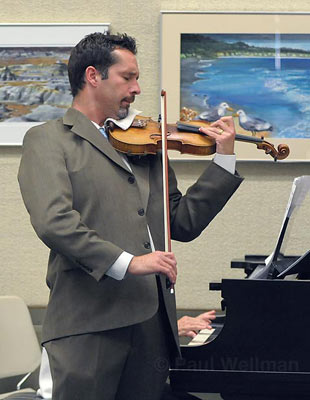Santa Barbara Music Club
At Faulkner Gallery, Wednesday, May 7.

Sitting high in the ranks of cultural activities in our town’s free-of-charge category, the Santa Barbara Music Club has been going strong for nearly 40 years. This club is open to all comers, from paid members and sponsors to regular concert-goers and lucky passersby who find themselves lured magnetically into the group’s daytime concerts, usually in the Central Library’s Faulkner Gallery. Drawing on the generosity and talent of Santa Barbara’s classical musician population, the Music Club offers a publicly accessible “open source” policy which has a civilizing effect on the musical landscape.
And more than just the expected conventional fare finds its way into the Faulkner (and other concerts in the Unitarian Society chapel). Last Wednesday morning, for instance, the program opened with pianist Jack Artusio’s reading of Haydn’s Sonata C, XVI:35 and it closed with Beethoven’s Sonata in G, Opus 30, No. 3, luminously performed by violinist Philip Ficsor and pianist Betty Oberacker. On less-trodden repertoire ground, soprano Takako Wakita sang songs of Joaqu-n (Concierto de Aranjuez) Rodrigo and traditional songs arranged by the likes of Benjamin Britten (replete with some of his dissonant work). Pianist John Sondquist and flutist Mary Jo Hartle joined in on the back line.
In a real way, the main event of the concert was the premiere of a new suite-called Suite-for violin and piano by Emma Lou Diemer, the longtime Santa Barbaran and well-traveled composer and keyboardist. Here, Diemer played piano with violinist Ficsor, a wonderful musician and professor at Westmont College who commissioned the work.
Diemer’s musical language is generally light and lyrical, as serious contemporary work goes, but comes spiced with vigorous rhythmic ideas-odd meters and syncopations line the way-and also harmonic colors reflecting the tart ‘n’ tasty side of the Modernist spectrum. Suite is delineated, fast-slow-fast style, into three movements with fairly self-defining titles: “Summer Day,” “Elegy,” and “Jazz Romp” (although in the latter, we hear more Ravel and Bart³k than jazz, per se). Diemer’s new piece has sophistication, substance, and also unpretentious charm on its side.
News is that the Ficsor-Diemer pairing is working on recording her complete works for violin and piano. We heard this impressive piece of that puzzle here first, in the Faulkner, on a program worth far more than the price of admission.



